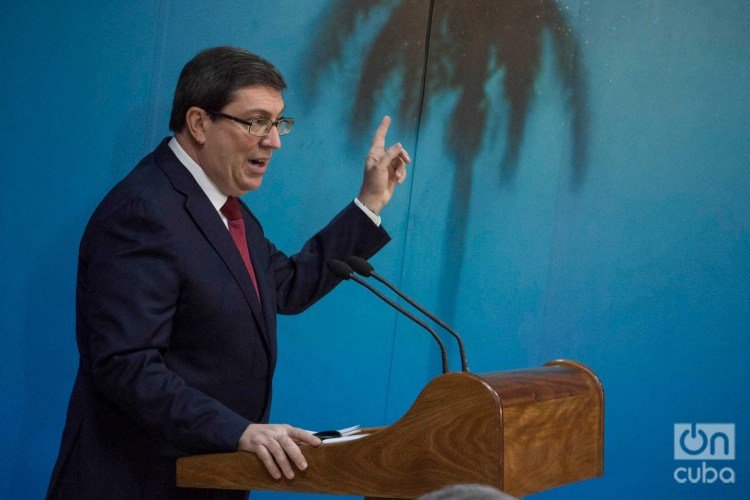Cuban Foreign Minister Bruno Rodríguez said in a message posted on the social media Twitter that Cuba “will remain committed” to the exercise of “all human rights.”
Following the celebration of Human Rights Day this Tuesday, Rodriguez confirmed his country’s support “in particular to peace, to life, to development and to self-determination,” while rejecting “the politicization, selectivity, punitive approaches and double standards” on that issue, one of the points of difference between the Cuban government and those of other nations and international organizations.
A day earlier, the island’s foreign minister had indicated that the U.S. government had chosen Human Rights Day to begin the ban on flights to Cuba except to Havana. In his tweet he said that in that way Washington “harms Cubans, even traveling, and family ties” and demanded “freedom to travel for Americans.”
El gobierno de #EEUU escoge el Día de los Derechos Humanos para iniciar la prohibición de los vuelos a #Cuba, excepto a La Habana. Daña a #CubanosConDerechos, incluso a viajar, y los vínculos familiares. Reclamamos libertad de viajar para los estadounidenses. #HumanRightsDay
— Bruno Rodríguez P (@BrunoRguezP) December 9, 2019
For his part, Cuban President Miguel Díaz-Canel, visiting Argentina―with the foreign minister―for the inauguration of Alberto Fernández, posted on Twitter a quote by deceased leader Fidel Castro, in which the latter said that “the first human right is the right to think, the right to believe, the right to live, the right to know, the right to know dignity, the right to be treated like other human beings, the right to be independent, the right to sovereignty as a people.”
Fidel: "… el primer derecho humano es el derecho a pensar, el derecho a creer, el derecho a vivir, el derecho a saber, el derecho a conocer la dignidad, el derecho a ser tratado como los demás seres humanos, el derecho a ser independiente, el derecho a la soberanía como pueblo" pic.twitter.com/ViFrB0zzuQ
— Miguel Díaz-Canel Bermúdez (@DiazCanelB) December 10, 2019
Meanwhile, in another tweet he said that “human rights in Cuba enshrine the full dignity of man,” and added the link to an article with that title published this Tuesday in the official daily Granma.
That text, signed by Enrique Moreno, affirms that “Cuba has repeatedly ratified its invariable commitment to the promotion and protection of all human rights for all persons, with its interdependent and indivisible character” and that “for this purpose, it advances sovereignly in the process of strengthening its legal and institutional framework.”
Moreno asserts that “while other international actors promote wars of prey, coups d’état and the politicized and selective treatment of human rights against governments that do not meet their hegemonic interests,” Cuba “has ratified 44 of the 61 international instruments in this matter―which represents 72.13% of the total―, placing it within the group of UN member states with the highest number of ratifications of this type.”
The text lists these international agreements signed by the Cuban government―without referring to those not signed―and quotes the island’s new Magna Carta, which in its article 41 says that “the Cuban State recognizes and guarantees the enjoyment and inalienable, imprescriptible, indivisible, universal and interdependent exercise of human rights for persons, according to the principles of progressivity, equality and non-discrimination.”
Meanwhile, other media cite a statement from the Cuban Foreign Ministry that ponders the island’s health and education systems, of universal and free coverage, as well as vaccination campaigns and citizen participation in the constitutional reform process, despite the embargo/blockade, which it describes as “the main obstacle to Cuba’s development.”
Despite this, the issue of human rights has been a matter of controversy between Havana and Washington―which on more than one occasion has criticized the situation of Cuba in this regard―and other governments and international organizations, particularly around issues such as citizen participation, political opposition and freedom of association, speech and press.
In some cases, as with the European Union (EU), the Cuban government has recognized “differences in focus” on the subject, but has shown its willingness to hold a “respectful” dialogue. It is precisely with the EU that it has held discussions in this regard, as part of the meetings that take place as part of the Agreement on Political Dialogue and Cooperation between both parties.
Issues such as the imprisonment of Cuban government opponents, not letting independent activists and journalists travel, and the role of medical missions outside the island have been the subject of recent controversies between Havana and other governments such as those in the United States and Brazil, which have evidenced differing points of view on human rights among those involved.










